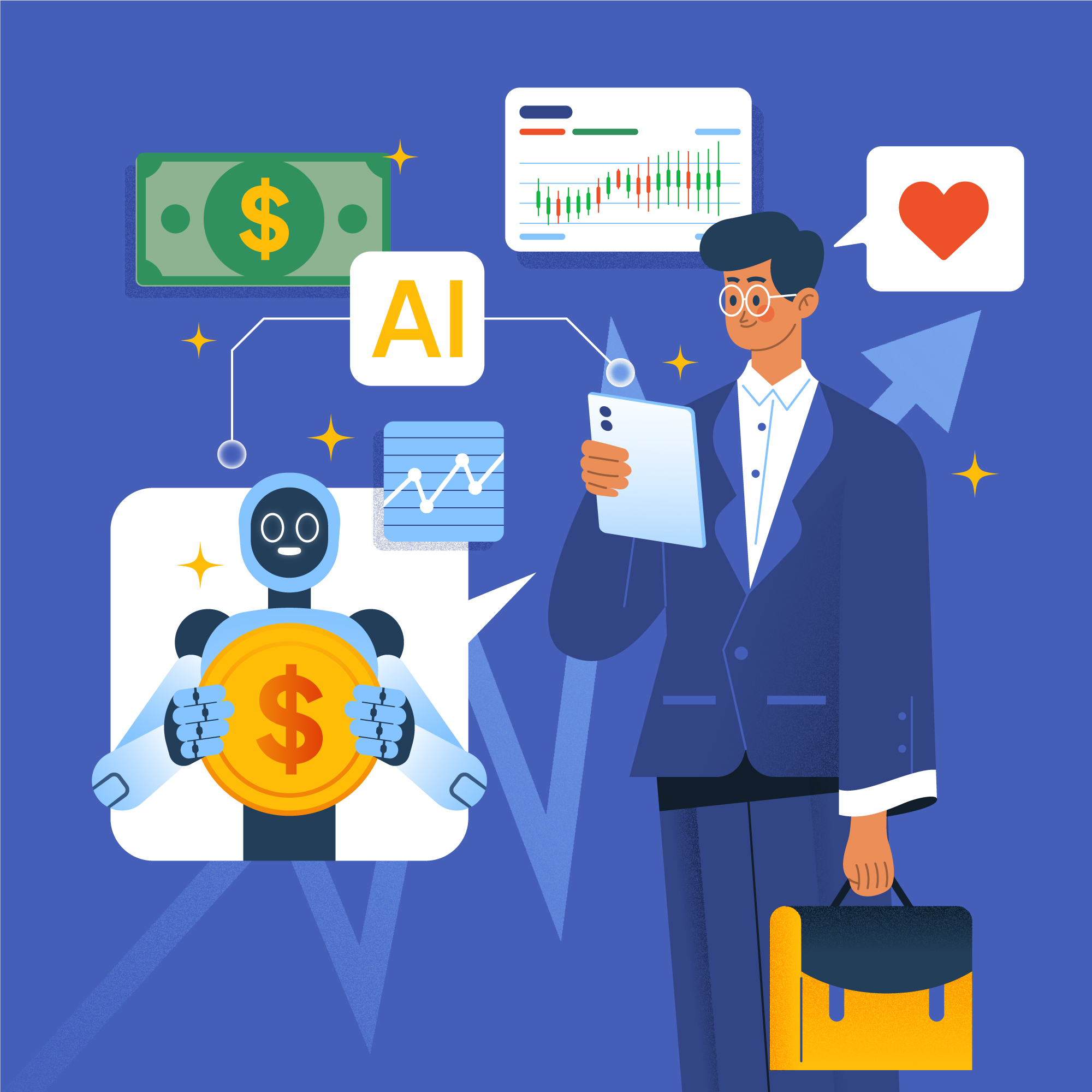The Age of AI and Automation
As we move deeper into 2024, it’s evident that AI-driven automation is no longer just a buzzword; it’s a powerful force driving the global business landscape. With its ability to streamline operations, enhance customer experiences, and boost profitability, AI is becoming the competitive edge that every forward-thinking company needs.
But how exactly is AI reshaping industries, and why should businesses care? Let’s explore the impact of AI technologies and how embracing these changes can future-proof your business.
The Rise of AI in 2024: Why Businesses Can’t Ignore It
In 2024, AI adoption has seen exponential growth across various sectors, with recent studies showing that businesses leveraging AI can increase their productivity by up to 40%. Companies are using AI to solve complex problems, optimize processes, and gain insights that were previously inaccessible.
Quick Fact: According to Gartner, AI is expected to create $2.9 trillion in business value and recover 6.2 billion hours of worker productivity by the end of 2024.
Understanding AI-Powered Automation: A Deep Dive into Core Technologies
Machine Learning (ML)
ML algorithms learn from historical data to make accurate predictions and decisions. For example, predictive analytics can help retailers forecast demand, reducing inventory costs and improving customer satisfaction.
Natural Language Processing (NLP)
NLP allows machines to understand and respond to human language, making it essential for chatbots, voice assistants, and automated customer support.
Robotic Process Automation (RPA)
RPA automates repetitive, rule-based tasks, freeing up employees for higher-value work. Use cases include data entry, invoice processing, and HR onboarding.
Key Industries Leading the AI Revolution in 2024
| Industry | AI Applications |
|---|---|
| Manufacturing | Predictive maintenance, quality control, supply chain optimization |
| Retail | Personalized recommendations, inventory management, dynamic pricing |
| Finance | Fraud detection, algorithmic trading, customer service automation |
| Healthcare | Diagnostics, patient data management, personalized treatments |
| Hospitality | Guest experience personalization, feedback analysis |
These sectors are not just experimenting with AI but are actively integrating it to transform their core operations.
AI-Powered Feedback: The Competitive Edge for Your Business
In today’s digital age, customer feedback is more critical than ever. AI-powered feedback tools, like Feedly, can help businesses collect, analyze, and act on customer feedback in real-time. Here’s how AI feedback systems can revolutionize customer experience:
- Sentiment Analysis: Understand customer emotions at scale.
- Automated Surveys: Deploy intelligent surveys that adapt based on customer responses.
- Predictive Insights: Identify trends and areas of improvement before issues arise.
Why it Matters: Businesses that effectively use AI feedback tools report a 25% increase in customer retention.
How AI Can Drive Business Efficiency
AI-powered automation can save businesses up to 30% in operational costs. Here’s how companies are using AI to streamline their operations:
- Automated Reporting: Generate real-time business reports.
- Predictive Maintenance: Reduce downtime with proactive equipment monitoring.
- Smart Scheduling: AI can optimize workforce schedules based on demand forecasts.
Case Study: A leading retail chain used AI to optimize its supply chain, resulting in a 15% cost reduction and 20% faster delivery times.
Data Privacy and Ethical AI: Building Trust with Customers
While AI offers many advantages, it also raises concerns about data privacy. Businesses must ensure that they comply with regulations like GDPR and CCPA. Here’s how Feedly addresses these concerns:
- Data Encryption: All customer data is encrypted to ensure security.
- Transparent Data Use: Clear policies on how data is collected, stored, and used.
- AI Ethics: Feedly uses ethical AI models to avoid biases in feedback analysis.
Leveraging AI for Customer Feedback: Introducing Feedly
Feedly is designed to help businesses harness the power of AI to gather actionable customer insights. Whether you’re a startup looking to build a loyal customer base or an established company aiming to enhance customer satisfaction, Feedly offers a suite of tools that can help:
- Real-Time Feedback Collection: Understand customer needs as they happen.
- Advanced Analytics: Turn feedback into actionable insights.
- Seamless Integration: Easily integrate Feedly with your existing CRM systems.
CTA: Want to revolutionize your customer feedback? Try Feedly today.
Actionable Steps to Implement AI in Your Business
Ready to embrace AI but not sure where to start? Here’s a quick guide:
- Identify Pain Points: Focus on areas where AI can drive the most value.
- Choose the Right Tools: Start with user-friendly AI solutions like Feedly.
- Train Your Team: Invest in AI training for your employees.
- Measure ROI: Track the impact of AI on your business metrics.
The Role of Ethical AI in Business Automation
As AI becomes increasingly integrated into business processes, the question of ethics and responsible AI usage is more critical than ever. In 2024, companies are not just looking at AI for automation but also considering how these technologies align with their corporate values.
- Data Privacy Concerns: With more businesses leveraging AI to collect and analyze customer data, ensuring compliance with data privacy regulations (like GDPR and CCPA) is paramount. Organizations need to be transparent about their data collection practices, especially when using AI-driven analytics.
- Bias and Fairness: AI algorithms are only as unbiased as the data they’re trained on. For example, in sectors like hiring, finance, and law enforcement, biases in AI can lead to unfair outcomes. Businesses must prioritize fairness and inclusivity in their AI models by regularly auditing and refining their algorithms.
- Environmental Impact: The use of AI requires significant computing power, leading to increased energy consumption. Companies can mitigate this by opting for energy-efficient AI models and cloud services that utilize renewable energy sources.
By adopting ethical AI practices, businesses can build trust with their customers and stakeholders, ultimately enhancing brand loyalty.
Leveraging AI for Marketing and Customer Experience
Marketing is one of the key areas where AI can significantly boost results. From personalized ad targeting to chatbots that offer 24/7 customer support, AI is transforming how brands interact with their audiences.
- AI-Powered Personalization: Gone are the days of one-size-fits-all marketing. AI enables businesses to deliver highly personalized content, emails, and product recommendations based on individual customer preferences. This leads to higher engagement rates and improved customer satisfaction.
- Voice Search Optimization: With the rise of smart speakers like Amazon Echo and Google Home, optimizing for voice search has become crucial. AI can help businesses adjust their SEO strategies to capture voice search queries, which are often longer and more conversational.
- Sentiment Analysis: Using AI to analyze customer reviews and social media mentions allows businesses to gauge public sentiment towards their brand. This real-time feedback is invaluable for making quick adjustments to marketing strategies and improving customer satisfaction.
AI in Human Resources: Enhancing Talent Management
The Human Resources (HR) sector is also experiencing a transformation with AI. HR teams are leveraging AI for talent acquisition, employee engagement, and performance management.
- Automated Resume Screening: AI tools can scan resumes and shortlist candidates based on specific keywords and skills, saving HR teams countless hours. However, it’s essential to regularly update these tools to ensure they do not inadvertently introduce bias.
- Employee Engagement: AI-powered platforms can monitor employee engagement levels by analyzing communication patterns, feedback surveys, and performance data. This helps organizations identify issues early and improve retention rates.
- Learning and Development: AI can create personalized learning paths for employees, focusing on skills that need improvement. This not only boosts employee performance but also prepares them for future leadership roles.
AI for Predictive Maintenance in Manufacturing
Manufacturing is one of the industries that have greatly benefited from AI, especially in the area of predictive maintenance. AI-driven solutions can predict equipment failures before they happen, minimizing downtime and saving costs.
- IoT and AI Integration: By combining IoT sensors with AI, manufacturers can monitor equipment in real-time. AI algorithms analyze data from sensors to detect early signs of wear and tear, enabling proactive maintenance.
- Supply Chain Optimization: AI can analyze market trends, demand forecasts, and supplier performance to optimize supply chain operations. This helps in reducing costs and ensuring timely delivery of products.
- Quality Control: Using AI-powered visual inspection systems, manufacturers can detect defects in products with high precision, ensuring quality control and reducing waste.
The Future of AI in Healthcare
The healthcare industry is another sector where AI is making a significant impact. From diagnosing diseases to personalizing patient care, AI technologies are enhancing healthcare delivery.
- AI Diagnostics: Machine learning algorithms can analyze medical images (like X-rays and MRIs) faster and more accurately than humans, leading to quicker diagnosis of conditions such as cancer.
- Virtual Health Assistants: AI-powered health assistants can provide patients with medical advice, appointment reminders, and even mental health support through chatbots, making healthcare more accessible.
- Personalized Medicine: AI can analyze a patient’s genetic makeup, lifestyle, and medical history to recommend personalized treatment plans, improving outcomes and patient satisfaction.
AI in Finance: Automating Fraud Detection and Trading
The finance sector is embracing AI to automate processes, reduce fraud, and improve customer experiences.
- Fraud Detection: AI algorithms can detect unusual transaction patterns, alerting banks to potential fraud cases in real-time. This proactive approach helps in protecting customer assets and reducing financial losses.
- Algorithmic Trading: AI-powered trading systems can analyze market data, predict trends, and execute trades at high speeds, giving investors a competitive edge.
- Customer Support: AI chatbots can handle customer inquiries, resolve issues, and offer financial advice, freeing up human agents for more complex tasks.
How Feedly AI Can Help Your Business
If you’re wondering how Feedly’s AI can support your business, here’s a quick rundown:
- Customer Feedback Analysis: Feedly uses AI to analyze customer feedback and reviews, providing actionable insights that help businesses improve their products and services.
- Sentiment Analysis: Our tool can gauge customer sentiment, allowing you to understand how your customers feel about your brand.
- Competitive Analysis: Feedly can track competitors and industry trends, giving your business a strategic advantage.
- Automated Reports: Save time with automated reports that highlight key performance metrics and actionable insights.
Conclusion: Embrace the AI Revolution
AI is not just a trend; it’s a game-changer for businesses across industries. Whether you’re in retail, manufacturing, healthcare, or finance, there are countless ways to leverage AI to drive efficiency, improve customer experiences, and stay competitive.
Don’t wait to be left behind. Start exploring AI solutions today, and let tools like Feedly help you unlock the potential of your business in 2024 and beyond.









